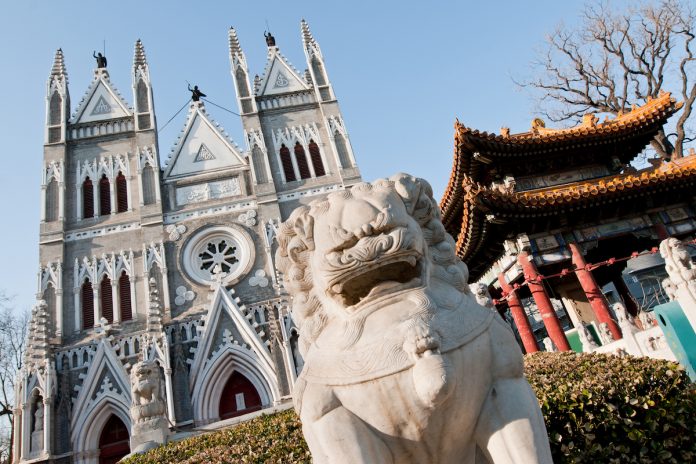Catholics in China must put loyalty to the state before their faith, according to a Chinese bishop.
“Love for the homeland must be greater than the love for the Church and the law of the country is above canon law,” Bishop John Fang Xingyao told a Political Consultative Conference on Religions last week, reported Asia News.
The gathering was a Communist Party sponsored meeting held in the capital Beijing to discuss religion in China.
Bishop Fang is head of Linyi Diocese in Shandong province in eastern China.
He is also president of the state-aligned Chinese Catholic Patriotic Association, which oversees mainland China’s Catholics and not recognized by the Vatican until a deal was struck between the Holy See and Beijing last year.
The agreement allowed communist officials a say in the appointment of bishops and to enforce “sinicization” — the process in which non-Chinese groups are put under the influence of Chinese culture and the Communist Party — on local Catholics.
Bishop Fang, who was appointed by Beijing in 1994 is also vice-president of the Council of Chinese Bishops and a member of the Standing Committee of the Chinese People’s Political Consultative Conference (CPPCCP).

For many years, the church on the mainland was divided between the Chinese Patriotic Catholic Association and the underground Church which remained in full communion with the Holy See.
Last year’s Vatican-China agreement, much of which remains undisclosed, was supposed to heal the rift.
However, some reports suggest those refusing to worship in government-run churches are being subjected to increased persecution as part of Chinese President Xi Jinping’s “sinicization” campaign to bring religion in China under the control of the communists.
CNA reported that priests in eastern China’s Jiangxi and Fujian provinces who refuse to sign agreements forcing them to obey government regulations have been evicted from their homes, and had their churches shuttered. Rebellious priests have also been denied freedom of movement, while others have gone into hiding.
Rights groups around the world say the persecution of religious minorities and unregistered churches has grown steadily worse because of “sinacization.”
Under revised “Regulations on Religious Affairs” introduced in February 2018, “unauthorized” religious teachings were effectively banned and children barred from entering churches.
Protestant churches under the state-run “Three-Self Patriotic Movement” were earlier this year told to replace displays of the Ten Commandments with lists of Xi’s sayings, in a sign that authorities were ratcheting up pressure on religions.
Meanwhile, since 2013, crosses have been removed from an estimated 1,500 Catholic and Protestant churches, while some other churches have been destroyed, reported CNA.
Only last month, a Catholic Church was pulled down following claims it didn’t have the required permits. A recent and often ignored rule prohibiting minors from entering churches is now being strictly enforced in many dioceses in China’s northern Hebei province, church people and parishioners say, reported LICAS News earlier this week.









